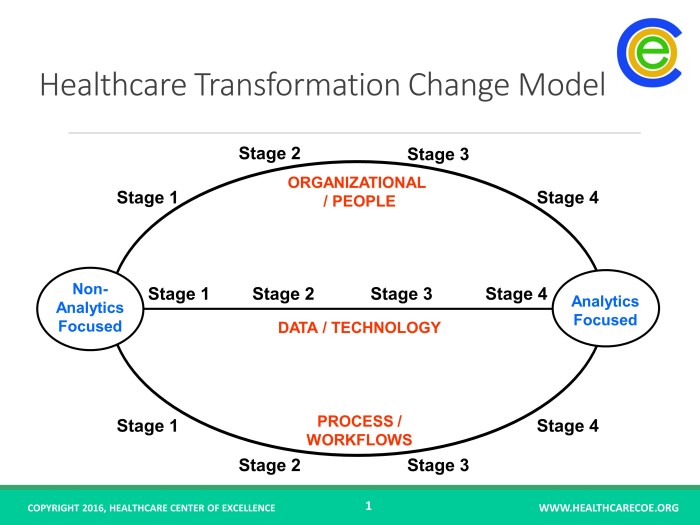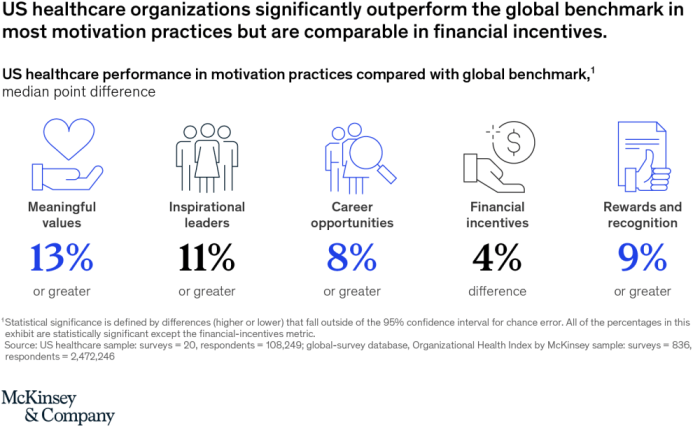Organizational Systems and Healthcare Transformation – D221 embarks on an in-depth exploration of the intricate relationship between organizational systems and the transformative landscape of healthcare. This discourse will delve into the various types of organizational systems employed in healthcare, their advantages and drawbacks, and real-world examples of successful implementations.
Healthcare transformation, a topic of paramount importance, will be thoroughly examined, with an emphasis on its key drivers, challenges, and opportunities. Case studies of transformative initiatives will be presented to illustrate the practical application of these concepts.
Organizational Systems in Healthcare

Organizational systems are the structures, processes, and technologies that healthcare organizations use to manage their operations and deliver care to patients. These systems play a critical role in the efficiency, effectiveness, and quality of healthcare delivery.
Types of Organizational Systems in Healthcare
- Functional systems:Group activities based on specific functions, such as finance, human resources, and patient care.
- Divisional systems:Organize healthcare organizations into divisions based on products, services, or geographic regions.
- Matrix systems:Combine functional and divisional systems, creating a more flexible and responsive organizational structure.
- Network systems:Connect healthcare organizations through partnerships, alliances, or joint ventures to share resources and improve care coordination.
Advantages and Disadvantages of Organizational Systems in Healthcare
| Organizational System | Advantages | Disadvantages |
|---|---|---|
| Functional | Simplicity, efficiency, clear lines of authority | Limited flexibility, potential for silos |
| Divisional | Flexibility, autonomy, improved responsiveness | Duplication of resources, coordination challenges |
| Matrix | Flexibility, improved communication, shared resources | Complexity, potential for conflict |
| Network | Resource sharing, improved care coordination, reduced costs | Coordination challenges, loss of autonomy |
Examples of Healthcare Organizations that have Successfully Implemented Different Organizational Systems, Organizational systems and healthcare transformation – d221
- Mayo Clinic (Functional):Known for its integrated, patient-centered care model.
- Kaiser Permanente (Divisional):A large, integrated healthcare system with divisions for health plans, hospitals, and medical groups.
- Cleveland Clinic (Matrix):A multi-specialty academic medical center that combines functional and divisional systems.
- Geisinger Health System (Network):A network of hospitals, clinics, and health plans that provides integrated care to communities in Pennsylvania.
Healthcare Transformation
Healthcare transformation refers to the ongoing process of improving the quality, efficiency, and accessibility of healthcare services. It involves adopting new technologies, implementing innovative care models, and rethinking the way healthcare is delivered.
Key Drivers of Healthcare Transformation
- Rising healthcare costs
- Changing patient demographics
- Advancements in medical technology
- Increased consumerism in healthcare
- Government regulations
Challenges and Opportunities Associated with Healthcare Transformation
- Challenges:Resistance to change, lack of resources, fragmented healthcare system
- Opportunities:Improved patient outcomes, reduced costs, increased access to care
Case Studies of Successful Healthcare Transformation Initiatives
- Intermountain Healthcare:Reduced hospital readmission rates and improved patient satisfaction through data-driven quality improvement programs.
- Kaiser Permanente:Integrated electronic health records and care coordination programs to improve patient outcomes and reduce costs.
- Cleveland Clinic:Implemented a patient-centered care model that resulted in reduced patient wait times and improved patient satisfaction.
The Role of Organizational Systems in Healthcare Transformation

Organizational systems can both enable and hinder healthcare transformation. They can provide the structure and processes necessary to support new care models and technologies. However, they can also create barriers to change if they are not aligned with the organization’s transformation goals.
How Organizational Systems Can Enable Healthcare Transformation
- Provide a framework for implementing new care models and technologies
- Facilitate collaboration and communication across different departments and disciplines
- Support data-driven decision-making and quality improvement
How Organizational Systems Can Hinder Healthcare Transformation
- Create silos and barriers to communication
- Limit flexibility and adaptability
- Encourage resistance to change
Framework for Assessing the Alignment between Organizational Systems and Healthcare Transformation Goals
- Identify the organization’s healthcare transformation goals
- Assess the current organizational systems
- Identify gaps and areas for improvement
- Develop a plan to align organizational systems with transformation goals
- Develop a clear vision for the transformation
- Assess the current organizational systems
- Identify and address gaps
- Implement new systems or modify existing systems
- Monitor and evaluate progress
- Increased use of technology and data analytics
- Shift towards value-based care
- Growth of integrated care models
- Focus on patient experience
- Challenges:Keeping pace with technological advancements, managing data privacy and security, addressing workforce shortages
- Opportunities:Improving patient outcomes, reducing costs, enhancing the patient experience
Best Practices for Implementing Organizational Systems for Healthcare Transformation

Implementing organizational systems that support healthcare transformation requires careful planning and execution. Best practices include:
Step-by-Step Guide for Implementing Best Practices
Table Comparing Different Implementation Strategies
| Implementation Strategy | Advantages | Disadvantages |
|---|---|---|
| Big bang | Quick and efficient | High risk, disruptive |
| Phased | Less disruptive, more manageable | Slower, more complex |
| Pilot | Low risk, allows for testing and refinement | Time-consuming, may not scale |
The Future of Organizational Systems in Healthcare

The future of organizational systems in healthcare is driven by emerging trends such as:
Emerging Trends in Organizational Systems for Healthcare
Forecast for the Future of Organizational Systems in Healthcare
Organizational systems in healthcare will become increasingly flexible, adaptable, and data-driven. They will support the delivery of high-quality, patient-centered care in a cost-effective manner.
Challenges and Opportunities for Healthcare Organizations in the Future
Commonly Asked Questions: Organizational Systems And Healthcare Transformation – D221
What are the key challenges in implementing organizational systems for healthcare transformation?
Resistance to change, lack of resources, and misalignment between systems and goals are common challenges.
How can healthcare organizations assess the alignment between their organizational systems and transformation goals?
A comprehensive framework involving stakeholder engagement, data analysis, and process mapping can be employed.
What are the best practices for implementing organizational systems that support healthcare transformation?
Involve stakeholders, leverage technology, establish clear communication channels, and monitor and evaluate progress regularly.